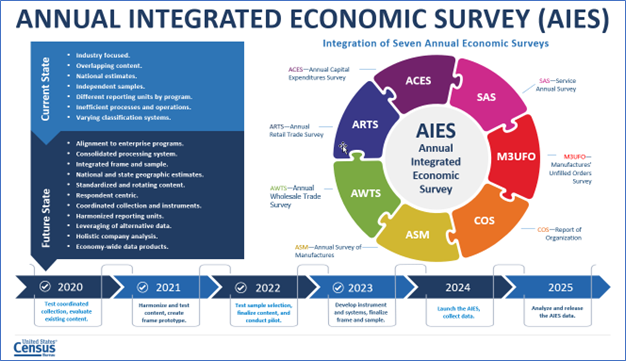As part of our ongoing commitment to innovation and to address our many stakeholder needs, the Economic Directorate has been working across all areas of the U.S. Census Bureau to reengineer our annual economic surveys. This process began in 2015, when the Census Bureau asked the Committee on National Statistics (CNSTAT) of the National Academies of Science, Engineering and Medicine to assemble a panel to conduct a comprehensive review of our annual economic surveys. Their findings and recommendations are summarized in this 2018 report “Reengineering the Census Bureau’s Annual Economic Surveys,” resulting in the Annual Integrated Economic Survey (AIES) that began data collection March 15.
Seven legacy annual economic surveys listed below have all had their final releases in their current format and are now integrated into a single survey – the AIES.
- Annual Capital Expenditures Survey (ACES).
- Annual Retail Trade Survey (ARTS).
- Annual Survey of Manufactures (ASM).
- Annual Wholesale Trade Survey (AWTS).
- Manufacturers’ Unfilled Orders Survey (M3UFO).
- Report of Organization (COS).
- Service Annual Survey (SAS).
For me, this integration represents how we are adapting to our ever-changing economy where economic activity does not always fall into one category. While we will continue to produce data by industry and sector, the vision of AIES is the integration of the data as well as the processes. By being open to doing surveys differently and more efficiently and not being limited by past practices, we are able to transform our business statistics, easily allowing for more robust data products that are cross-cutting rather than program-specific.


The U.S. Census Bureau today announced the appointment of 23 members to its new 2030 Census Advisory Committee (2030 CAC).
The 2030 CAC members, who represent various stakeholder organizations, groups, interests and viewpoints, have extensive census and survey experience. Under its charter, the 2030 CAC will assist the Census Bureau in devising strategies to increase awareness of and participation in the next decennial census, reduce barriers to response and enhance the public’s trust and willingness to respond.
“This talented group of specialists will provide the myriad perspectives and expertise that will help us produce statistical data to accurately render the beautifully diverse and dynamic nature of the nation’s population,” Census Bureau Director Robert L. Santos said.
The newly appointed members are:
“The 2030 Census Advisory Committee’s insights on how to address persistent undercounts and overcounts, communicate with different communities in culturally relevant ways, and to collect information in easy and efficient ways are crucial to planning the decennial census,” said Deborah Stempowski, associate director for Decennial Census Programs. “As we enter the last year of our “Design Selection Phase”, this continued engagement with stakeholders is critical while we consider the public feedback we collected along with the results of our research and testing.”
The committee is set to hold its first meeting in the near future. The meeting will be open to the public via webcast.
“The 2030 Census Advisory Committee will focus on engaging the public to participate in the decennial census through operational, technical and communications strategies,” Santos said. “We’ll also continue to work with our enterprise-level committees – the National Advisory Committee and Census Scientific Advisory Committee – to get their feedback on the many programs and initiatives across our agency.”
The committee members will each serve a three-year term and may serve an additional term at the director’s discretion. More information can be found on the 2030 CAC webpage.
Commenting on blog posts requires an account.
Login is required to interact with this comment. Please and try again.
If you do not have an account, Register Now.